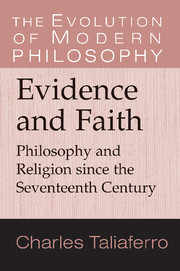Book contents
- Frontmatter
- Contents
- Acknowledgments
- Introduction
- 1 The Sovereignty of the Good in Seventeenth-Century Philosophy of Religion
- 2 Cartesian Philosophy of Religion
- 3 The Ascendancy of Rules of Evidence in Early Modern Philosophy of Religion
- 4 Humean Philosophy of Religion
- 5 Kantian Philosophy of Religion
- 6 Religion and the Philosophical Gods and Giants
- 7 Continental and Feminist Philosophy of Religion
- 8 Five Major Moves
- 9 Religions, Evidence, and Legitimacy
- Appendix A A Guide to Further Study
- Appendix B Select Contemporary Philosophers
- Select Bibliography
- Index
3 - The Ascendancy of Rules of Evidence in Early Modern Philosophy of Religion
Published online by Cambridge University Press: 15 December 2009
- Frontmatter
- Contents
- Acknowledgments
- Introduction
- 1 The Sovereignty of the Good in Seventeenth-Century Philosophy of Religion
- 2 Cartesian Philosophy of Religion
- 3 The Ascendancy of Rules of Evidence in Early Modern Philosophy of Religion
- 4 Humean Philosophy of Religion
- 5 Kantian Philosophy of Religion
- 6 Religion and the Philosophical Gods and Giants
- 7 Continental and Feminist Philosophy of Religion
- 8 Five Major Moves
- 9 Religions, Evidence, and Legitimacy
- Appendix A A Guide to Further Study
- Appendix B Select Contemporary Philosophers
- Select Bibliography
- Index
Summary
Light, true light in the mind is, or can be nothing else but the evidence of the truth of any proposition; and if it be not a self-evident proposition, all the light it has, or can have, is from the clearness and validity of those proofs upon which it is received…. Reason must be our last judge and guide in everything.
John LockeLocke's Essay
John Locke's Essay Concerning Human Understanding was published in 1689. His Essay places before us a salient case for governing our beliefs about ourselves, the world, and God by a fair-minded impartial weighing of evidence. John Locke began this work in 1670.
In the course of composing the Essay, Locke worked as secretary to the Earl of Shaftesbury (from 1667 to 1675), whose political career included vying for both sides in England's Civil War (first for the king, then for Parliament), playing an ambivalent role in Cromwell's government, and then acting as a commissioner who facilitated the restoration of the monarchy. He engaged in Anglo-European diplomacy, stood trial for treason, and went into exile in Holland. Locke's own life at the time of composing and publishing the essay was precarious. Locke was a Protestant like Shaftesbury, who favored the Protestant succession of the monarchy, along with parliamentary democracy and civil liberty. The reign of James II, a Roman Catholic, was an unstable period – socially, religiously, and politically – and this compelled Locke to seek refuge, like his patron, in Holland.
- Type
- Chapter
- Information
- Evidence and FaithPhilosophy and Religion since the Seventeenth Century, pp. 110 - 159Publisher: Cambridge University PressPrint publication year: 2005



